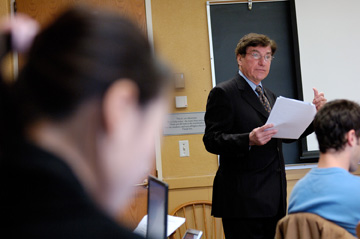Faculty Spotlight: Robert L. Pfaltzgraff, Jr.
Today I’m happy to turn back to the Faculty Spotlight feature. Professor Robert Pfaltzgraff is the Shelby Cullom Davis Professor of International Security Studies at The Fletcher School and President of the Institute for Foreign Policy Analysis, a research organization based in Cambridge, MA and Washington, DC. Professor Pfaltzgraff currently teaches International Relations: Theory and Practice and Crisis Management and Complex Emergencies. He also teaches the Security Studies course for Fletcher’s Global Master of Arts Program.
Because Fletcher encompasses the world of the theorist and the policymaker, the scholar and the practitioner, it is an ideal setting to bring the academic into sharper focus with the policy community and vice versa. This is what has always shaped both my teaching at The Fletcher School and my work directly with the policy community as President of the Institute for Foreign Policy Analysis. We learn from the insights, wisdom, and experience of others and from our own successes and failures — from observing and from doing. Both Fletcher and the Institute for Foreign Policy Analysis have given me great and unique opportunities in both communities to share with students and others.
 At Fletcher my teaching spans the Political Systems and Theories and International Security Studies fields. My International Relations Theory course challenges students not only to understand the theories themselves but also to relate them to the world of today. Through the lens of theory we may gain perspectives or ways of understanding, analyzing, and simply thinking about the policy issues and choices of the day, related to fundamentally important topics such as international conflict and cooperation, as well as war and peace.
At Fletcher my teaching spans the Political Systems and Theories and International Security Studies fields. My International Relations Theory course challenges students not only to understand the theories themselves but also to relate them to the world of today. Through the lens of theory we may gain perspectives or ways of understanding, analyzing, and simply thinking about the policy issues and choices of the day, related to fundamentally important topics such as international conflict and cooperation, as well as war and peace.
My teaching in the International Securities Studies field is also designed to bridge theory and practice. My Crisis Management seminar addresses such topics as the twenty-first-century crisis map contrasted with previous eras, including the Cold War, as well as the role of military force and diplomacy, to mention only several of the major topics that we study. There is an extensive literature about crisis escalation, decision-making, strategizing, and lessons learned from past crises that we survey. In addition to team presentations, we conduct an annual weekend crisis simulation that brings together up to 200 outside participants and other members of the Fletcher community. This provides a great opportunity to test and fine-tune what we have (or should have) learned in class about how to manage international crises. Here we have an opportunity to learn on the job, so to speak — to develop skills and ways of thinking that could be useful to the future crisis decision-makers that many of our students will become. In this and other International Securities Studies activities, we draw heavily on practitioners and others from the military and policy communities both from outside Fletcher and our students, who, I should add, bring a rich set of experiences and backgrounds and therefore learn from each other.
There has also been a two-way street, a synergistic relationship, between my work at the Institute for Foreign Policy Analysis and my Fletcher teaching experience. Our many Institute conferences, seminars, and workshops, together with research on such topics as escalation, proliferation, military force structures, strategy, alliance relationships, technological innovation and military affairs, and regional security issues from NATO-Europe to the Middle East to the Asia-Pacific area have given me a wealth of information, insights, and greater understanding to share with my classes and others in the academic and policy communities. By the same token, I have always learned much from my students, many of whom have achieved positions of senior political and military leadership in the United States and abroad.
My bottom line is that I know of no better educational setting than Fletcher in which to bring together the worlds of theory and practice — to learn how to think and to act, understanding of course that creative thought is the necessary prerequisite to successful action in and among all of the fields of our multidisciplinary curriculum.